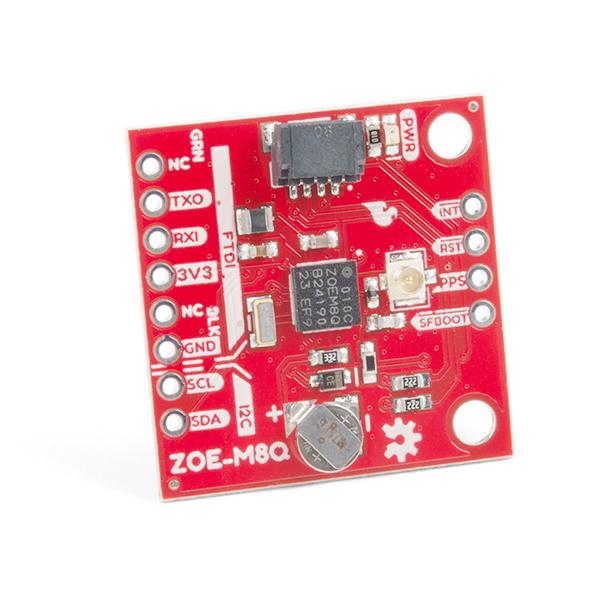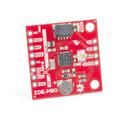SparkFun GPS Breakout - ZOE-M8Q (Qwiic)

Description Links Attachments
The ZOE-M8Q GPS Breakout can be configured using the u-center program, allowing for customization of various functions such as baud rates, update rates, geofencing, spoofing detection, external interrupts, SBAS/D-GPS, and more. These configurations can be made within the SparkFun Arduino Library. The UART pin grouping on the breakout is configured to an industry standard, ensuring easy connection to a Serial Basic.
This GPS Breakout is equipped with an on-board rechargeable battery that powers the RTC on the ZOE-M8Q. This significantly reduces the time-to-first fix from a cold start to a hot start. The battery can maintain RTC and GNSS orbit data for up to five hours without being connected to power. To keep the receiver compact, a U.FL connector is included for the use of both large standard ceramic antennas and very small chip scale antennas.
Note: The I2C address of the ZOE-M8Q is 0x42 and is software configurable. A multiplexer/Mux is required to communicate with multiple ZOE-M8Q sensors on a single bus. If you need to use more than one ZOE-M8Q sensor, consider using the Qwiic Mux Breakout.
The SparkFun Qwiic Connect System is an ecosystem of I2C sensors, actuators, shields, and cables that simplifies prototyping and reduces chances of error. All Qwiic-enabled boards use a common 1mm pitch, 4-pin JST connector, reducing the required PCB space. The polarized connections ensure correct hook-up.
The ZOE-M8Q GPS Breakout can be automatically detected, scanned, configured, and logged using the OpenLog Artemis datalogger system, eliminating the need for programming, soldering, or setup.
Features:
- 72-Channel GNSS Receiver
- 2.5m Horizontal Accuracy
- 18Hz Max Update Rate
- Time-To-First-Fix:
- Cold: 26s
- Hot: 1s
- Max Altitude: 50,000m
- Max G: ≤4
- Max Velocity: 500m/s
- Velocity Accuracy: 0.05m/s
- Heading Accuracy: 0.3 degrees
- Time Pulse Accuracy: 30ns
- 3.3V VCC and I/O
- Current Consumption: ~29mA Tracking GPS+GLONASS
- Software Configurable
- Geofencing
- Odometer
- Spoofing Detection
- External Interrupt
- Pin Control
- Low Power Mode
- Many others!
- Supports NMEA, UBX, and RTCM protocols over UART or I2C interfaces
Properties
| Brand | Sparkfun |
| Model | GPS-15193 |
| More info | SparkFun GPS Breakout (ZOE-M8Q and SAM-M8Q) Hookup Guide - learn.sparkfun.com |
Alternative products
- SparkFun GPS-RTK-SMA Breakout - ZED-F9P (Qwiic) € 320,50 View product
- LilyGO TTGO SIM ESP32 Development Board T-SIM7000G - 18650 Battery Holder € 43,- View product
- SparkFun GPS Breakout - Chip Antenna, SAM-M8Q (Qwiic) € 43,40 View product
- SparkFun GPS Breakout - XA1110 (Qwiic) € 49,90 View product
- Adafruit Ultimate GPS HAT for Raspberry Pi A+/B+/Pi 2/3/4/Pi 5 € 37,- View product
- SparkFun GPS-RTK2 Board - ZED-F9P (Qwiic) € 320,50 View product
- Opencircuit GY-NEO6MV2 GPS module € 5,40 View product
- SparkFun GPS Dead Reckoning Breakout - NEO-M8U (Qwiic) € 88,75 View product
- SparkFun GPS Breakout - NEO-M9N, Chip Antenna (Qwiic) € 94,50 View product
- Sparkfun GPS Receiver - GP-735 (56 Channel) € 63,- View product
- SparkFun GPS Breakout - NEO-M9N, U.FL (Qwiic) € 87,50 View product
- Adafruit Ultimate GPS Logger Shield - Includes GPS Module € 37,- View product
- SparkFun GPS Breakout - NEO-M9N, SMA (Qwiic) € 94,25 View product
Customer questions
Customer Reviews
- In stock Sparkfun Alligator Test Leads - Multicolored (10 Pack) € 6,50 View product
- In stock Sparkfun Teensy Stackable Header Kit (Extended) € 2,90 View product
- In stock Sparkfun RJ45 8-Pin Connector € 2,50 View product
- In stock Sparkfun Voltage Regulator - 3.3V € 3,- View product
- In stock Sparkfun Qwiic JST Connector - SMD 4-Pin (Vertical) € 1,45 View product
- In stock Sparkfun Capacitor Ceramic 0.1uF € 1,20 View product
- In stock Sparkfun Mini Power Switch - SPDT € 2,30 View product
- In stock Sparkfun Voltage Regulator - Adjustable LM1117 SMD € 2,- View product
- In stock Sparkfun Copper Tape - Conductive Adhesive, 5mm - 15 meter € 7,75 View product
- In stock Sparkfun Rotary Encoder - Illuminated (RGB) € 7,20 View product
- In stock Sparkfun Clear Plastic Knob € 1,75 View product
- In stock Sparkfun Silicone Electrical Tape - Pack of 10 Strips € 8,65 View product
- In stock SparkFun Micro 6DoF IMU Breakout - BMI270 (Qwiic) € 21,75 View product
- In stock Sparkfun Resistor Lead Bending Tool € 11,- View product
- In stock Sparkfun Hobby Motor - Gear € 3,50 View product










